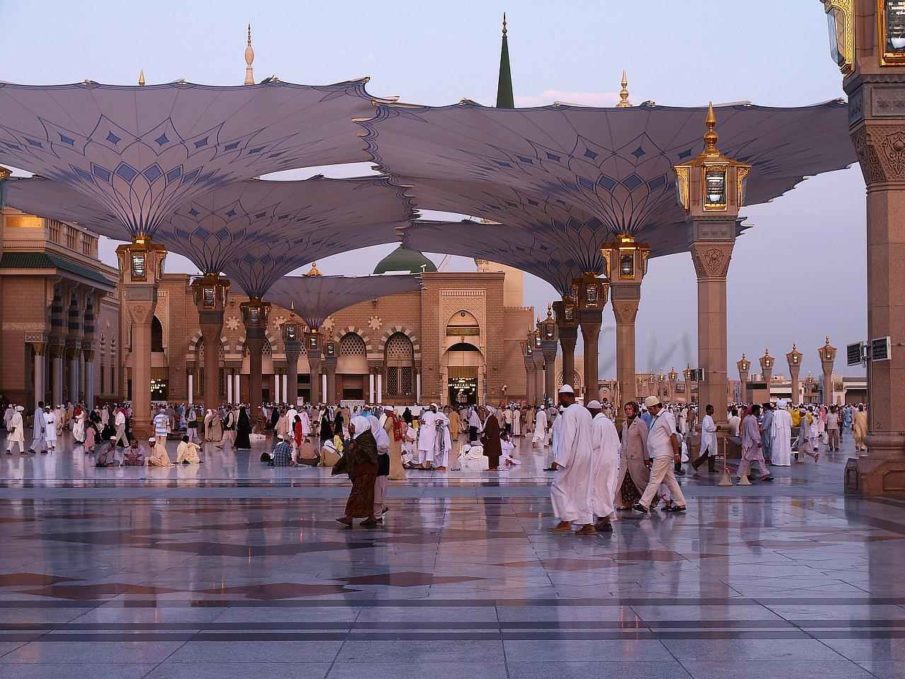Current and former U.S. officials say a recent ISIS attack on the tomb of Mohammed in Saudi Arabia — Islam’s second holiest site — shows the terror group is now directly challenging the kingdom’s ruling family and trying to topple the monarchy.
“The Saudi king’s tiles include ‘Protector of the two Holy Cities,” said one senior U.S. counterterrorism official. “The message of the attack is that that protection doesn’t exist.”
The kingdom’s two holy cities, Mecca and Medina, are home Islam’s two holiest sites, the Qabba in Mecca, which millions of pilgrims visit every year, and the Mosque of the Prophet in Medina, which holds Mohammed’s tomb.
Said the counterterrorism official, “If [the royal family] can’t protect those places — and people traveling to those cities from across Islam – it calls in to question the fitness of their ruling power and its legitimacy.”
The Medina attack, one of four launched by ISIS in Saudi Arabia on July 4, the next to last day of the holy month of Ramadan, took place in a parking lot about one-third of a mile from the Mosque of the Prophet. The driver of a car was confronted by four security people and detonated his suicide belt, killing himself and the officers.A classified U.S. intelligence report called the attempt to attack the Mosque of the Prophet “unprecedented. They got very close.”
On the same day, two other suicide bombers struck near a Shia mosque in eastern Saudi Arabia, and a fourth targeted the U.S. consulate in Jeddah. No one was killed in the attacks except the bombers. (On Thursday, the State Department warned of “a potential imminent threat against U.S. citizens in Jeddah” and urged caution.)
The attacks, said the counterterrorism official, were risky for ISIS because they could lead to a crackdown inside the kingdom similar to a 2003-04 Osama bin Laden-inspired bombing campaign in the capital of Riyadh that led to the arrest of hundreds, if not thousands, of suspected al Qaeda operatives.
Bruce Riedel who served as senior director for Near East and North African Affairs at the National Security Council during the al Qaeda bombing wave, called July’s ISIS attacks “by far the most serious attacks in the Kingdom in a decade.”
“There is clearly an infrastructure from the Gulf to the Red Sea supporting terrorism,” he said. “The attack on the Prophet’s Mosque on the eve of Eid [the holiday that ends Ramadan] is unprecedented. Bin Laden never attacked the Holy Mosques in his insurrection a decade ago.”
Read more at NBC news
Image courtesy of eastizeast.wordpress.com
Already have an account? Sign In
Two ways to continue to read this article.
Subscribe
$1.99
every 4 weeks
- Unlimited access to all articles
- Support independent journalism
- Ad-free reading experience
Subscribe Now
Recurring Monthly. Cancel Anytime.
Current and former U.S. officials say a recent ISIS attack on the tomb of Mohammed in Saudi Arabia — Islam’s second holiest site — shows the terror group is now directly challenging the kingdom’s ruling family and trying to topple the monarchy.
“The Saudi king’s tiles include ‘Protector of the two Holy Cities,” said one senior U.S. counterterrorism official. “The message of the attack is that that protection doesn’t exist.”
The kingdom’s two holy cities, Mecca and Medina, are home Islam’s two holiest sites, the Qabba in Mecca, which millions of pilgrims visit every year, and the Mosque of the Prophet in Medina, which holds Mohammed’s tomb.
Said the counterterrorism official, “If [the royal family] can’t protect those places — and people traveling to those cities from across Islam – it calls in to question the fitness of their ruling power and its legitimacy.”
The Medina attack, one of four launched by ISIS in Saudi Arabia on July 4, the next to last day of the holy month of Ramadan, took place in a parking lot about one-third of a mile from the Mosque of the Prophet. The driver of a car was confronted by four security people and detonated his suicide belt, killing himself and the officers.A classified U.S. intelligence report called the attempt to attack the Mosque of the Prophet “unprecedented. They got very close.”
On the same day, two other suicide bombers struck near a Shia mosque in eastern Saudi Arabia, and a fourth targeted the U.S. consulate in Jeddah. No one was killed in the attacks except the bombers. (On Thursday, the State Department warned of “a potential imminent threat against U.S. citizens in Jeddah” and urged caution.)
The attacks, said the counterterrorism official, were risky for ISIS because they could lead to a crackdown inside the kingdom similar to a 2003-04 Osama bin Laden-inspired bombing campaign in the capital of Riyadh that led to the arrest of hundreds, if not thousands, of suspected al Qaeda operatives.
Bruce Riedel who served as senior director for Near East and North African Affairs at the National Security Council during the al Qaeda bombing wave, called July’s ISIS attacks “by far the most serious attacks in the Kingdom in a decade.”
“There is clearly an infrastructure from the Gulf to the Red Sea supporting terrorism,” he said. “The attack on the Prophet’s Mosque on the eve of Eid [the holiday that ends Ramadan] is unprecedented. Bin Laden never attacked the Holy Mosques in his insurrection a decade ago.”
Read more at NBC news
Image courtesy of eastizeast.wordpress.com










COMMENTS